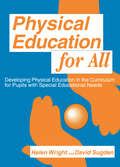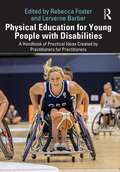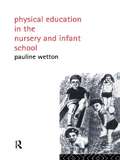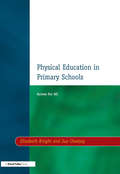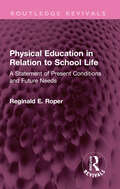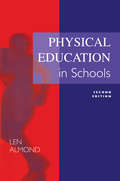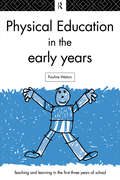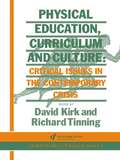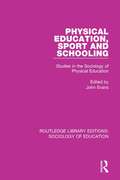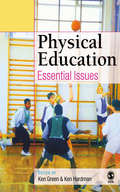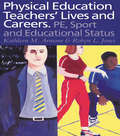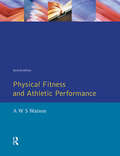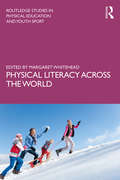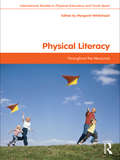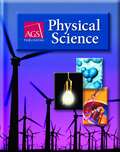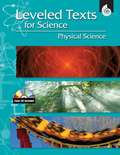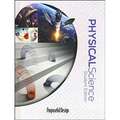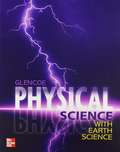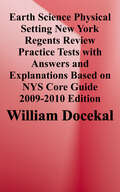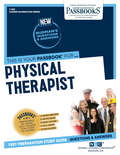- Table View
- List View
Physical Education for All: Developing Physical Education in the Curriculum for Pupils with Special Difficulties (Entitlement For All Ser.)
by David A. Sugden Helen C. WrightFirst Published in 1999. Routledge is an imprint of Taylor & Francis, an informa company.
Physical Education for Young People with Disabilities: A Handbook of Practical Ideas Created by Practitioners for Practitioners
by Rebecca Foster Lerverne BarberPhysical Education for Young People with Disabilities explores a range of methods that will support teachers to be more inclusive in their practice when planning and teaching Physical Education. Offering many practical ideas to include pupils with specific additional needs across a range of activity areas, such as athletics, dance, gymnastics and swimming, this book will increase practitioners' confidence, enabling them to feel equipped to meet individual needs and include all pupils in their lessons. The range of authors provides a wide perspective and wealth of experience, and all the ideas have been trialled with students and young people, both nationally and internationally. Written by practitioners for practitioners, this book is a valuable resource for trainee teachers, in-service teachers and practitioners working in a practical or sporting context with young people, and will support Physical Education lessons and physical activity sessions.
Physical Education for Young People with Disabilities: A Handbook of Practical Ideas Created by Practitioners for Practitioners
by Rebecca Foster Lerverne BarberPhysical Education for Young People with Disabilities explores a range of methods that will support teachers to be more inclusive in their practice when planning and teaching Physical Education. Offering many practical ideas to include pupils with specific additional needs across a range of activity areas, such as athletics, dance, gymnastics and swimming, this book will increase practitioners' confidence, enabling them to feel equipped to meet individual needs and include all pupils in their lessons. The range of authors provides a wide perspective and wealth of experience, and all the ideas have been trialled with students and young people, both nationally and internationally.Written by practitioners for practitioners, this book is a valuable resource for trainee teachers, in-service teachers and practitioners working in a practical or sporting context with young people, and will support Physical Education lessons and physical activity sessions.
Physical Education in Nursery and Infant Schools
by Pauline WettonFirst published in 1987. Routledge is an imprint of Taylor & Francis, an informa company.
Physical Education in Primary Schools: Access for All
by Elizabeth Knight Sue ChedzoyFirst Published in 1998. Routledge is an imprint of Taylor & Francis, an informa company.
Physical Education in Relation to School Life: A Statement of Present Conditions and Future Needs (Routledge Revivals)
by Reginald E. RoperFirst published in 1917, Physical Education in Relation to School Life views the problems of growth and health in relation to education. The main outlines of a satisfactory physical education and its importance are indicated. The author has compared his aims and objectives, and appreciated the practical value of some of the better-known methods of dealing with the problems, and has suggested the direction in which future improvements may most usefully be sought. This book will be of interest to students of physical education, pedagogy and history.
Physical Education in Schools (Books For Teachers Ser.)
by Len AlmondAt a time when PE has become a compulsory part of the National Curriculum, this book focuses on the role of PE and sport in schools. This edition includes sections on the National Curriculum, vocational education, GNVQ and GCSE.
Physical Education in the Early Years
by Pauline WettonThis book begins with an overview of the first months of a child's life, with an indication of the major movement milestones which all children should reach before they enter the pre-school phase. The rest of the book gives information about developing children's physical skills in dance, games and gymnastics throughout the pre-school and infant school phase. It also addresses many of the contemporary issues surrounding the delivery of the PE curriculum in schools including the assessment of pupil's performance.This book will help students, teachers and curriculum leaders deliver a sound PE education to children aged 3-7, and will also prove useful to all those involved in early years education. Pauline Wetton is currently a lecturer in education and an assistant director of sport at the University of Durham.The Teaching and Learning in the First Three Years at School series is edited by Joy Palmer.
Physical Education, Curriculum And Culture: Critical Issues In The Contemporary Crisis
by Richard TinningThis collection of studies addresses contemporary issues and problems in the physical education curriculum. While each of the chapters illustrates the diverse range of practical curriculum issues currently facing physical education, the continuities between them also suggest a certain commonality of experience in Britain, North America and Au tralia. In each it is difficult not to detect at least some rumblings of the various crises - environmental, political, economic, social - that are increasingly impacting on everyday lives in the present and shaping thoughts and plans for the future. The editors stress that physical education is a part of social life and is therefore a key site for the production and legitimation of important cultural mores, values and symbols.
Physical Education, Sport and Schooling: Studies in the Sociology of Physical Education (Routledge Library Editions: Sociology of Education #20)
by John EvansIn Britain the physical education curriculum has been experiencing a period of unrest. For many teachers the practices of decades have become problematic features of their curriculum and teaching. This book, first published in 1986, explores the experiences of teachers and pupils in programmes of physical education from a sociological perspective. In explores a range of issues relating to the organisation and management of physical education departments, deviancy and dissent in sport, gender inequalities and the concepts of community education and leisure education. This title will be of interest to students of sociology and education.
Physical Education: Essential Issues
by Ken Green Dr Ken Hardman`For any student of physical education, Physical Education provides an excellent springboard from which to explore theoretical aspects of their subject. The list of authors reads like a who's who of PE and the extensive list of references provides opportunities to investigate areas of interest in more depth' - John Matthews, Chief Executive PEA UK 'Distinguished authors who provide critical analyses of key contemporary issues in physical education: a core text.... Required reading for anybody seeking insight into the key issues of the day in physical education' - Dr Dick Fisher, Vice Principal of St. Mary's University College and Honorary President of the European Physical Education Associations Aimed at students of physical education and sport in schools, this book consists of a collection of essential readings, covering a breadth of salient and enduring themes, as well as contemporary issues. Many of the authors are distinguished figures who have, over the last two decades, made substantial and distinctive contributions to our understanding of the process of physical education. Themes explored include: the nature and values of physical education; the relationship between the subject and physical activity and health; the growth of examinations in physical education and innovations and developments in teaching styles and formats. The study of physical education has increasingly become multi-disciplinary and inter-disciplinary and the book reflects this, incorporating philosophical, sociological, pedagogical and comparative perspectives. This book will give readers, both in the UK and internationally, and at all levels of education, a greater understanding of the subject.
Physical Education: PE, Sport And Educational Status
by Robyn L. Jones Kathleen R. ArmourExplores the lives and careers of physical education teachers from two perspectives. Firstly, teachers' life-stories illustrate how eight teachers became involved with sport, how they entered the physical education profession, why they developed particular teaching philosophies, and how they have tried to progress in their teaching careers. Secondly, a broader thematic analysis identifies issues which arise throughout the teachers' stories and locates them within the wider international research literature. Low status is identified as an enduring concern, and it is argued that this stems from a lack of empirical research into the educational outcomes which are claimed for physical education.
Physical Fitness and Athletic Performance: A Guide for Students, Athletes and Coaches
by A.W.S. WatsonSports Science has increasingly developed both as an area of research and as a university subject. This book gives an authoritative account of the biological basis of athletic performance and training, based on an analysis of scientific and medical research in the area. The findings are presented in such a way that anyone involved in training for high-level sport will find the information accessible and of interest.
Physical Literacy across the World (Routledge Studies in Physical Education and Youth Sport)
by Margaret WhiteheadPhysical Literacy across the World records the progress of the concept of physical literacy over the last decade. It examines developments, issues and controversies in physical literacy studies, and looks at how the concept has been implemented around the world. Contributions from practitioners and researchers across the world tell unique stories of the way physical literacy is changing perceptions of physical activity through research and the generation of scholarly writing, the creation of new national and local policies, and the development of partnerships with a range of professions. The book argues that physical literacy has value beyond formal education, such as in occupational and recreational settings, as well as for early years children and older people, and shows how life story methods can explain our physical literacy journeys. At root, it sets out a case for the significance and value of physical literacy as making a notable contribution to human flourishing. This is important reading for anyone with an interest in physical activity, health and well-being, sport studies, physical education, or the philosophy related to physical activity.
Physical Literacy: Throughout the Lifecourse (Routledge Studies in Physical Education and Youth Sport)
by Margaret WhiteheadWhat is physical literacy? What are the benefits of being physically literate? The term ‘physical literacy’ describes the motivation, confidence, physical competence, understanding and knowledge that individuals develop in order to maintain physical activity at an appropriate level throughout their life. Physical literacy encompasses far more than physical education in schools or structured sporting activities, offering instead a broader conception of physical activity, unrelated to ability. Through the use of particular pedagogies and the adoption of new modes of thinking, physical literacy promises more realistic models of physical competence and physical activity for a wider population, offering opportunities for everyone to become active and motivated participants. This is the first book to fully explore the meaning and significance of this important and emerging concept, and also the first book to apply the concept to physical activity across the lifecourse, from infancy to old age. Physical Literacy – explaining the philosophical rationale behind the concept and also including contributions from leading thinkers, educationalists and practitioners – is essential reading for all students and professionals working in physical education, all areas of sport and exercise, and health.
Physical Science
by Donald H. Jacobs Robert H. MarshallPhysical Science text, students learn the properties of matter, elements, compounds, electricity, and sound and light. Students reading significantly below grade level gain practice in working with data and sharpen their abilities to infer, classify, and theorize. Lexile Level 840 Reading Level 3-4 Interest Level 6-12 Features and Benefits Aligns with NCTM Standards ELL/ESL appropriate Track student progress with Skill Track Software Concepts presented in clear, simple language Problem solving and word problems encourage students to relate skills to real-life situations Relevant practice activities such as comparison shopping and figuring interest rates Supplemental problems for additional practice and review Calculator activities reinforce computation skills Over 300 additional activities available on the Teacherâ s Resource Library CD-ROM Research and Validity AGS Globe publishes high-interest, low-reading level textbooks, instructional materials, and assessments for students with a wide range of special needs. The purpose of this report is to document how AGS Globe textbooks are aligned with scientific research that supports best practices in pedagogy, instructional design, and instructional techniques.
Physical Science (Leveled Texts For Science)
by Don Herweck Joshua BishopRoby Jane Weir Elizabeth R. C. Cregan Kyle Shuler Dennis BenjaminUncover how and why things work in our universe with 15 essential scientific concepts that involve topics in states of matter, The Periodic Table, vibrations and chemical reactions. This resource provides suggestions for differentiating instruction to meet the needs to all readers and offers four visually identical texts for each topic, each suited for below, on, and above grade levels, and English language learners. Each high-interest informational text is perfect for close reading or small-group instruction and is complemented with comprehension questions specific to each reading level. This resource is aligned to college and career readiness standards.
Physical Science Student Edition
by Purposeful Design PublicationsThe ACSI/Purposeful Design Physical Science Student Edition Textbook will teach students about the basics of physical science. Written from a Christian perspective, this textbook encourages students to embrace science as the systematic study of God's creation through observation and experimentation-and to use the study of physical science to help us better understand and appreciate God's creation.Seven units cover matter, types of substances, interactions of matter, matter in motion, energy at work, sound and light, and electricity and magnetism. Units begin with a list of new vocabulary and key ideas. Chapters within the unit include objectives, photos, interesting sidebars, "try this" activities, charts, and more. Chapters end with lesson review questions. Additional features include: - Worldview connections - Scientific inquiry and investigation exercises that develop critical thinking skills - Hands-on learning activities that excite students to want to know more - A focus on the language and processes of science - Tools to help students be responsible for understanding concepts and lesson objectives.
Physical Science class 10 - Andhra Pradesh Board
by Prof. Mahendroo B. Naidu M. Salagram K. Rao N. Reddy C. SharmaThe text book physical science for standard 10 contains 14 chapters. The book explains chapters on physics and chemistry with examples and illustrations to solve, helping in understanding the topic better and with ease.
Physical Science with Earth Science
by Charles William Mclaughlin Marilyn Thompson Ralph FeatherNIMAC-sourced textbook
Physical Science with Earth Science
by Dinah Zike Charles William Mclaughlin Marilyn Thompson Ralph FeatherThe book covers different topics that can be classified under the two main categories Earth science ( that investigates Earth and space) and Physical science (that studies matter and energy.)
Physical Science, Fourth Edition
by Rachel Santopietro R. Terrance EgolfPhysical Science Student Worktext (4th ed.) is an exciting and engaging introduction to the world of physics and chemistry. Designed and written for the 9th-grade level, it provides an essential foundation for subsequent science courses, including Biology, Chemistry, and Physics. This textbook also shows that true science involves glorifying God and serving our fellow humans. Through practical Bible integration, students learn that a Christian worldview permeates true science. The textbook does not assume any prior knowledge in physics or chemistry, other than normal life experiences. It builds a foundation of basic information regarding matter and measurements early in the text; then furnishes the student with the key principles and scientific laws of classical physics, thermodynamics, electricity, magnetism, sound, light, and optics. After mastering these concepts, students are equipped to study more advanced concepts such as the structure of the atom, compounds and chemical reactions, and mixtures and solutions.
Physical Setting Regents Earth Science Practice Tests
by William DocekalA practice Test Booklet that contains 4 full length NYS Regents Physical Setting Earth Science. This booklet has fully explained Answers and Reference Tables.Used to prepare high school students for the New York State Regents Physical Setting Earth Science.
Physical Therapist: Passbooks Study Guide (Career Examination Series #C-1018)
by National Learning CorporationThe Physical Therapist Passbook® prepares you for your test by allowing you to take practice exams in the subjects you need to study. It provides hundreds of questions and answers in the areas that will likely be covered on your upcoming exam, including but not limited to; Application of the principles and practices of physical therapy in the administration of a physical therapy program; Supervision; and more.
Physical, Earth, and Space Science: An Integrated Approach
by Thomas C. HsuPhysical, Earth, and Space Science provides an integrated approach to inquiry based, hands-on science programs for high school Physical Science classes. Earth and space science concepts are integrated with physics and chemistry concepts. For example, students learn how major science concepts such as energy, heat, and forces apply to earth and space sciences.
